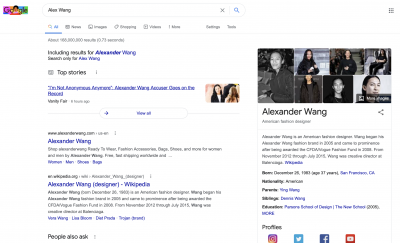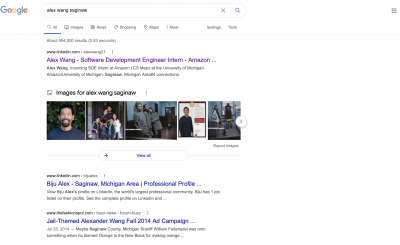Alex Wang
In order to discover what information about me is available online, I've spent a decent amount of time searching for myself on the web. Below, I summarize and analyze my findings.
Contents
Thoughts Before Searching
Before starting the project, I already had predictions on what the results would be like. As 'Alex Wang' is a very common name, I predicted that I would have a tough time finding myself based solely on my name. Furthermore, as I am not well connected in the online world, I expected to receive far fewer results than someone who uses social media religiously. Finally, I believed my online data identity would be incomplete and inauthentic. This is primarily because I view people as dynamic beings who cannot be represented completely by an online profile. Likewise, as people are always changing, it is virtually impossible for everything online to be up to date.
My 'Google' Identity
Search Query: 'Alex Wang'
I began by searching only my first and last name. As expected, none of the search results had anything to do with me. In fact, as can be seen in the image above, all of the popular results were about Alexander Wang, a fashion designer. This was bound to happen even if I had a decent online presence, as Alexander Wang is famous worldwide. Realizing there was no point in sifting through hundreds of thousands of query results, I decided to change my search query.
Search Query: 'Alex Wang Saginaw'
I decided to be more specific with my search query and included the city I lived in throughout middle and high school. I figured this would give me at least a few results related to me. Expectedly, I was able to find several search results about me. In fact, the top result was my LinkedIn profile, as seen to the right of this section . A few results down, you'll be greeted by links to mathematics competitions I competed and received awards in during high school. Go a page further and you'll see a middle school science fair I was part of, as well as a summer camp I attended in high school. What I didn't find, however, was my Facebook page. This likely can be attributed to the fact that I have very little information about me on the account other than that I attend the University of Michigan.Looking Deeper
After using Google to see what information about me is publicly available, I decided to investigate my LinkedIn and Facebook profiles. Starting with LinkedIn, I noticed that my profile information was for the most part up to date and correct. This came as no surprise, though, as I have been diligent in updating my professional profile. While my profile contains information about my experiences over the years, it also has a link to my personal website. Unlike LinkedIn, my portfolio website is significantly outdated. Moving on, as I rarely use Facebook, my account contains little information about me. The information that exists, however, is all accurate.
Privacy and Transparency Concerns
One of the main reasons I barely use social media is because of concerns over privacy. These concerns were reinforced when using Facebook to investigate my data identity. Alarmingly, I was quickly exposed to ads for products that were awfully similar to what I had recently been searching for on Amazon and other websites. Unsurprisingly, when navigating to my ad preferences, I immediately noticed that I was allowing Facebook to use data collected from other sites. Having not touched my privacy settings since creating the account, I came to the conclusion that Facebook had set data collection usage to be on by default. This example of Facebook and its ads showcases how social media platforms choose to neglect user privacy; important settings are often hidden in complex pages, with default settings disregarding user concerns over privacy. Transparency is also an issue in social media. In reference to Turilli and Floridi's "The ethics of information transparency," transparency is described as being dependent on a plethora of factors, including the availability and accessibility of information. Relating the reading back to my example, the accessibility of the information pertaining to Facebook's data collection usage is clearly lacking. Without clear transparency, it is quite foolish to trust social media platforms.
Analysis of My Online Data Identity
Brief Context Behind the Results
Unlike many of my peers, I've been fortunate enough to have had a privileged upbringing. I attended a small selective school for the gifted and talented, and had the resources to participate in competitions and other extracurricular activities. At the same time, going to a school with an average graduating class of about 40-50 students also affected how much I valued social media. I never felt the need to be heavily connected in the social media world, as it wasn't something that was important to me or my peers; we saw each other everyday and texted outside of school. Thus, as one might expect, the majority of my pertinent query results are related to the extracurricular activities I took part in.
Main Findings
My Data Identity is Incomplete
One thing I found throughout my investigation was that my data identity was incomplete. Synonymous to how words can only do so much to describe a person, your online profiles and information only reveal so much. This is especially true for me, as my profiles are mostly incomplete. For instance, my Facebook account contains only my current and past education; the rest of my profile is still empty. If someone were to judge me based on my profile, they would assume I have no hobbies or interests outside of school. This is far from the truth, but your online identity is an incomplete representation of who you are.
My Data Identity is Unauthentic
If someone were to look me up, they would think I'm heavily involved in math competitions and research (due to past competitions and science fairs). Although this was true years ago, it isn't today, highlighting the temporality of my data identity. Thus, my online identity is unauthentic, as some aspects would lead you to think of me differently than who I am today. Likewise, even my LinkedIn is somewhat unauthentic; due to personal laziness, it says I still work at a startup that I recently left. These examples show how your data identity can be unauthentic due to several reasons. While some of it is in your control, not all of it is.
Overarching Themes: Temporality and Imperfect Representation
From a broad perspective, my findings highlight two major themes of online identity: temporality and imperfect representation. First, an online data identity provides an incomplete and coalesced representation of a person. With one Google search, I was able to find several top results of math competitions and science fairs I competed in when I was younger. While they forever will exist as items of my online identity, the competitions and fairs I participated in are only a temporary part of my actual life. In fact, my interests have completely shifted since beginning college. Therefore, your online data identity is temporal in nature; some aspects reflect who you are today, while others represent who you were in the past. Consequently, an online data identity is also an imperfect representation of a person; there is only so much information about a person online, and much of it is outdated and doesn't embody who they are today.
Conclusion
The findings support my prediction that my online data identity would be incomplete and unauthentic. It is incomplete because only so much information is provided through profiles and articles, and even the profiles are oftentimes not fully completed (as seen with my Facebook profile). In addition, my data identity is unauthentic. Information is not completely up to date and doesn't fully represent who I am today. I believe this isn't a specific case, though, and that everyone's data identity is inaccurate to some degree. These findings emphasize the temporality of your online data identity, as well as the dynamic nature of people. People are always changing, and what's on the internet doesn't always perfectly represent who they are in real life.
References
Turilli, M., Floridi, L. The ethics of information transparency. Ethics Inf Technol 11, 105–112 (2009).

